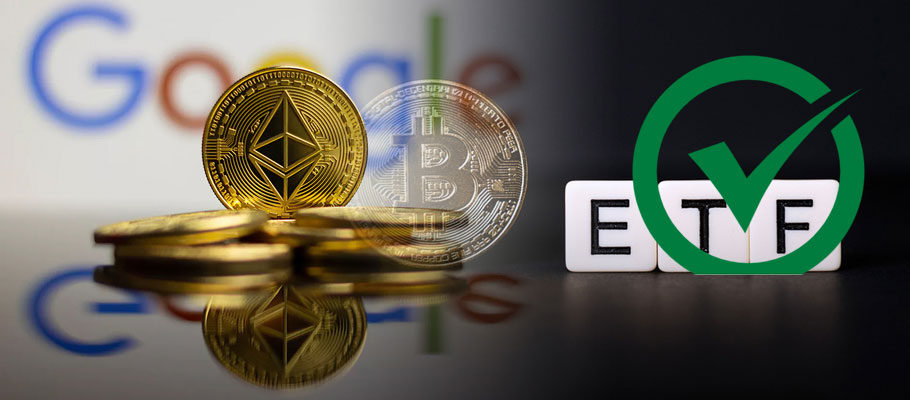
Published: December 13th, 2023
Google announced this week that it’s set to ease restrictions on crypto advertisements, opening the door to marketing campaigns that promote ‘cryptocurrency coin trusts.’
The search and online advertising giant’s updated policy will allow Google-verified advertisers to run ads and Google AdWords campaigns for ‘financial products that let investors buy and sell shares in trusts that comprise significant amounts of cryptocurrency.’
For the last few months, a rising chorus of crypto watchers, financial pundits, and Wall Street banks has been predicting regulatory approval for America’s first spot Bitcoin ETF, a watershed event that could open the faucet for billions in new crypto market liquidity from traditional finance.
Now the world’s most-visited website and largest advertising medium appears to have joined in.
Google’s policy update will come into effect on 29th January 2024. Financial analysts have speculated that the first USA spot Bitcoin ETF will probably be approved by the Securities and Exchange Commission (SEC) in the second week of the new year.
The company hasn’t added any clarifications about its definition of a crypto trust. Would the term cover, for example, investments vehicles like Exchange Traded Funds (ETFs)? Only time will tell. For now, the change does suggest that the normally risk-shy big tech behemoth is getting ready to profit from a market where crypto-based financial instruments are an accepted part of the global financial services sector.
ETF’s track the underlying price of a given asset. They enable investors to take a position in unpredictable assets like crypto, without owning the asset directly. Many investors see ETFs as a way to take advantage of crypto gains while shielding themselves from potential volatility.
Google’s advertising policies effectively ban any advertisement that promotes the purchase, sale, or trade of cryptocurrencies. That includes initial coin offerings (ICOs), token liquidity pools, and DeFi protocols. Google does allow ads from crypto exchanges, as long as they are licensed, regulated, in compliance, and certified by Google. Perhaps signaling what was to come, Google relaxed its rules for NFT game advertisements back in late Summer 2023.
In August, a seemingly crypto-skeptic US Securities and Exchange Commission (SEC) decided to sit on the much-watched application for a spot Bitcoin exchange-traded fund from ARK 21Shares, apparently delaying it indefinitely.
In a public filing, America's top financial services regulator said it needed more time to consider the application’s merits before deciding to approve or deny it.
ARK Invest filed its application for a Bitcoin ETF, called Ark21Shares, in May of 2021. The company partnered with its Swiss sister company 21Shares AG to launch the new product. If it gets the green light, shares in the ETF would be listed on the Cboe BZX Exchange as ARKB.
Spot Bitcoin ETFs have been a topic of intensifying interest for more than year, as the US has yet to license one despite growing investor hunger for a made-in-the-USA option.
SEC chairman Gary Gensler says the agency has been cool to the idea of crypto ETFs because it believes Bitcoin’s price is vulnerable to manipulation.
Experts say access to a spot Bitcoin ETF would allow investors to take position in BTC without having to take on the risks of custody.
The SEC is considering a number of high-profile applications for a Bitcoin ETF. Despite ongoing reluctance, analysts believe the watchdog has been signaling that one could be approved soon.
While it may not be able to stem the tide of investor interest in crypto opportunities, the SEC looks determined to slow things down.
In late May 2023 the price of Bitcoin fell sharply and kicked off an overall plunge in crypto markets after the agency began enforcement action against Binance, the world’s biggest crypto exchange.
In the view of regulators, the company ‘demonstrated utter disregard for American securities law.’ The SEC’s filing says Binance has 'illegally tried to convince US crypto traders to buy, sell, and trade digital assets’ which the SEC says are ‘securities’ under US law.
The agency’s lawsuit alleges that in December 2018, Binance’s Chief Commerical Officer (CCO) admitted the company was running afoul of US securities law.
In a separate filing also made on 5th June, the SEC added several leading cryptocurrencies, including Solana, Cardano, and Binance’s own Binance Coin (BNB) to the list of securities that fall under its jurisdiction.
In total, the agency said 12 separate tokens being traded on Binance were classed as securities. Crypto market watchers have noted that most of the 12 fetch minimal volumes and depend on Binance for the lion’s share of their liquidity.
In terms of overall trading volume, Binance is a dominant force in global crypto trading. Data from CoinGecko showed that more than USD 11 billion in trades had occurred in the 24 hours between Monday 5th June and Tuesday 6th June. That beat the volume achieved by Coinbase, Binance’s nearest competitor, by a factor of 10.
The world's leading crypto exchange has often failed to inspire confidence amongst regulators and even business partners. In May of this year the company announced it would end deposits and withdrawals in Sterling from 22nd May.
An email sent to exchange users on Monday, 13th March said the company’s payments processor Skrill, which provides Binance’s Faster Payments Service in the UK, has backed out of a deal to support GBP transactions.
At time of writing, new Binance accounts were restricted from making GBP deposits, though the company said in its email that current users would still be able to access their GBP balances until the May deadline.
According to Binance, the change affected less than one per cent of its crypto trading user base.